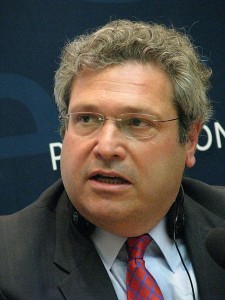After Netanyahu Wins Israel Vote With Racism and Vow of Permanent Occupation, How Will World Respond?
Wednesday, 18 March 2015 00:00 By Amy Goodman and Juan González, Democracy Now! | Video Interview
Israeli Prime Minister Benjamin Netanyahu has won a surprise election victory, putting him on course for a fourth term in office. Netanyahu's Likud Party is poised to control 29 or 30 seats in the 120-member Knesset. The Zionist Union opposition placed second with 24 seats. A united list of Arab parties came in third with 13 seats. Netanyahu closed out his campaign with a vow to oppose a Palestinian state, reneging on his nominal endorsement of a two-state solution in 2009. Netanyahu also vowed to expand the illegal West Bank settlements and issued a last-minute plea to supporters denouncing a high turnout of Arab voters. The Zionist Union, Netanyahu's chief rival, also ran on a platform for Israel to keep the major Israeli settlement blocs in the occupied West Bank, the home of any future Palestinian state. Likud says Netanyahu intends to form a new government in the coming weeks. Talks are already underway with a number of right-wing parties. To discuss the election, we are joined by two guests: Jamal Zahalka, an Arab member of the Israeli Knesset and chair of Balad party, which is part of the Joint List of Arab parties; and Amira Hass, correspondent for the Israeli newspaper Ha'aretz in the occupied Palestinian territories.
TRANSCRIPT:
This is a rush transcript. Copy may not be in its final form.
JUAN GONZÁLEZ: We're going to move on now to Israel, where Israeli Prime Minister Benjamin Netanyahu's Likud party has won a surprise victory, putting him on a course for a fourth term in office. With 99.5 percent of the votes counted, Likud won 29 or 30 seats in the 120-member Knesset. The Zionist Union opposition placed second with 24 seats. A united list of Arab parties came in third. Exit polls had showed Likud and the Zionist Union in a close tie, but in the final days of the campaign, Netanyahu stressed his right-wing positions. He visited the Har Homa settlement and vowed to ramp up the construction of more settlements in occupied East Jerusalem. And he unequivocally ruled out allowing a Palestinian state, thus reneging on his nominal 2009 endorsement of a two-state solution. On Election Day, he railed against Israel's Arab voters.
PRIME MINISTER BENJAMIN NETANYAHU: Right-wing rule is in danger. Arab voters are streaming in mass to the polling stations. Left-wing nonprofit organizations are bringing them in buses. Go out to the polling station, bring your friends and family, and vote Likud, in order to close the gap between us and the Labor Party. With your help and God's help, we will form a national government and protect the state of Israel.
AMY GOODMAN: In a statement, Likud said Netanyahu intended to form a new government within weeks, with negotiations already underway with a number of parties, including the pro-settler Jewish Home party and ultra-Orthodox groups.
Isaac Herzog, the leader of the Zionist Union and the son of a former Israeli president, conceded defeat, saying he had called Netanyahu to congratulate him. The Zionist Union also ran on a platform for Israel to keep major settlement blocs in the occupied West Bank, keep Jerusalem as Israel's "undivided" capital, and block the right of return for Palestinian refugees.
On Tuesday, Saeb Erekat, chief Palestinian negotiator, responded to the election results.
SAEB EREKAT: Well, I think there is also, the Israeli elections indicate business as usual. It seems to me that Mr. Netanyahu will form the next government in Israel. And we all heard what he said yesterday. He said if he is re-elected as the prime minister in Israel, Mr. Netanyahu said, he will not allow a Palestinian state. He will continue with settlement activities and dictations. I believe he was not campaigning in the elections. I believe he was honest, and he specified his truth. Mr. Netanyahu has done nothing in his political life but to destroy the two-state solution. And I believe now it's up to the international community to stop treating this prime minister as a prime minister that's above the laws of man. And he should be held accountable. And he should—the international community should not cover him or give him impunity. Impunity will mean more conflict, more complicities, and it will not make peace. Justice will make peace.
AMY GOODMAN: Palestinian negotiator Saeb Erekat.
To talk more about the Israeli election, we're joined by two guests. Joining us from Tel Aviv, Jamal Zahalka, he is an Arab member of the Israeli Knesset, chair of the political bloc of Arab parties known as the Joint List, which took third place in Tuesday's election, winning 13 seats. He has served as a member of the Knesset since 2003. Here in New York, we're joined by the Israeli journalist Amira Hass, correspondent for the Israeli newspaper Ha'aretz in the occupied Palestinian territories. She's based in Ramallah. She's the only Israeli Jewish journalist to have spent more than 20 years living in and reporting from Gaza and the West Bank. Her book, Diary of Bergen-Belsen: 1944-1945, written by her mother, Hanna Lévy-Hass, with her own afterword and introduction, is also just out in paperback this week.
We welcome you both to Democracy Now! Let's begin with you, Amira Hass. Your reaction? Would you call this a surprise victory of—
AMIRA HASS: Not at all, not at all. The whole campaign was not about the real issues of war, of occupation, of Israeli continued colonization. The cosmetic differences between the Labor, which is now called the Zionist Alliance or the Zionist Camp, and Likud were minor, did not attract people's real enthusiasm. What Netanyahu has been offering for the past years continues to be a winning horse for most of the people. That means the nonexistent welfare state in Israel proper now exists by the occupied territory in the forms of colonies, well-pampered colonies, so it is always an option for Israelis to move to the occupied territory to improve their conditions. Inside Israel, his policies guarantee that there will be continued the discriminated—the policy which discriminates Palestinians, Israeli citizens, from their—against the Israeli Jews. With a combination of support of the right-wing parties—of the religious parties, I think his position was guaranteed. The change would have been only in the puzzle—I mean, if he would get 28 seats and not 30 seats. So, for me, I didn't expect much more.
And when people say that it is because he promised now not to have a Palestinian state, to do everything against a Palestinian state, his actions have done everything possible to prevent this from happening anyway. So it's not about statements that the people fall to. I mean, it's the reality that he's established for the past—and not only he, other parties as well. So it's not about the last-moment statements, I think, that—what guaranteed his position. Labor—anyway, the two-state solution that people, that other parties, like the Labor Party, advocate, I call it the 10-state solution or the seven-, eight- solutions, which doesn't see Gaza in a Palestinian state, and the Palestinian state itself is a bunch of bantustans inside the West Bank.
JUAN GONZÁLEZ: And what about the impact on the international community of Netanyahu's last-minute veering even more to the right on many of these issues and his attacks on Arab citizens within Israel?
AMIRA HASS: Yeah, sure, sure.
JUAN GONZÁLEZ: What's going to be the long-term impact.
AMIRA HASS: This has to be seen, because, I mean, we always expect, you know—we feel that each, every time Israel is crossing a red line, and now is the moment for the world to react, and there it doesn't react, the world. So still we want to see it reacting. We thought that the war on Gaza was a red line that was crossed again, and good relationships with Europe, with America continue. So, of course, we want to hope that something will change, and not only among rank-and-file and grassroots levels, but also among the political echelons in their decisions. But so far, as long as Israel is considered part of the enlightened, democratic West, and Israelis are welcome, and Israeli support teams are welcome everywhere in the world, and scientists, etc., Israel is seen as part of this world.
AMY GOODMAN: We're going to go to break, and when we come back, we'll go to Tel Aviv, as well, to get response from Dr. Jamal Zahalka, who is a Knesset member for more than a decade and chair of the Joint List. This is Democracy Now! We'll be back in a minute.
JUAN GONZÁLEZ
Juan González co-host's Democracy Now! with Amy Goodman. González has been a professional journalist for more than 30 years and a staff columnist at the New York Daily News since 1987. He is a two-time recipient of the George Polk Award.
AMY GOODMAN
Amy Goodman is the host and executive producer of Democracy Now!, a national, daily, independent, award-winning news program airing on over 1,100 public television and radio stations worldwide. Time Magazine named Democracy Now! its "Pick of the Podcasts," along with NBC's Meet the Press.
RELATED STORIES
Netanyahu Announces Deal to Free Shalit
By Ethan Bronner, The New York Times News Service | Report
Netanyahu Apologizes as Isolated Israel Needs Turkey Deal
By Paul Jay, The Real News Network | Video
Benjamin Netanyahu's Ideologically Dictated Worldview
By Lawrence Davidson, SpeakOut | Op-Ed






